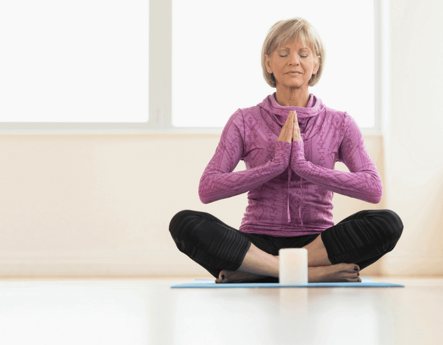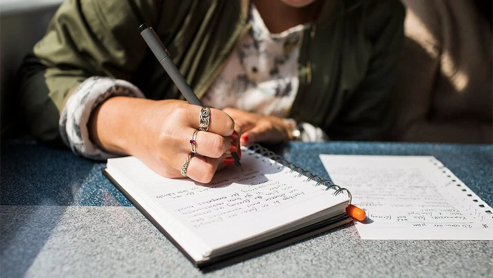8 Ways To Recover From A Breakup
A breakup can knock even the most confident and secure person off of their feet. For a while, the entire world feels like it’s upside down. Many people report feeling lost or off-balance and aren’t sure where to begin life again after their breakup. If this sounds familiar to you, we’ve got you covered. Below, you’ll find eight ways to help yourself recover from a breakup - it’s as easy as making a SANDWICH.
S-elf-care
A-ccept
N-ew view
D-etox
W-rite
I-dentify
C-onnect
H-obbies
Let’s unpack that sandwich…
1. Self-care
If you don’t already have a good foundation of self care routines, now is a perfect time for you to create them. Breakups can leave us feeling like we’re at our worst and weakest. Being able to nurture ourselves is one of our most powerful recovery tools.
There are six kinds of self care:
Emotional (that lets you connect & process a full range of emotions) Physical (improving your physical health) Social (things that deepen and nurture your other relationships) Mental (stimulating your mind) Practical (keeping your day-to-day life running, going to work) Spiritual (meditation, yoga, or worship)
Incorporating these acts of self-care throughout your day, once every few hours for 5 or 10 minutes, can help you recharge your inner battery and keep yourself moving through the tough transition into recovery.
2. Accept the 'new normal'
When a relationship is over you may become uncertain about things you’ve never had before. Things that you had gotten used to or comfortable with are suddenly not a factor anymore. If you used to carpool to work or class with a partner, now you might have to take a bus. Maybe you used to keep your weekend nights open for dates or trips, but now you’re faced with a lot more free time than you used to have.
Don’t worry - you’ll be able to make the best of the new situation you’re in with time and a fresh perspective. But in order to do that, you first have to fully accept where you’ve landed. Embrace your breakup and your new ‘single’ status. Falling into denial or other cognitive distortions (like holding onto false hope) postpones the progress that you could be making. I suggest looking into a mirror say this out loud:
My relationship is over. My life is not over.
3. New view
Initially, a breakup feels like one giant rejection. If you are the ‘dumpee’, the breakup might feel like a slap in the face. If you’re the ‘dumper’, the breakup might stir up feelings of wasted time and energy. Even if the breakup was mutual, odds are you might feel disappointed or ‘let down’ from not being able to solve the problems that challenged you as a couple. But what if your breakup isn’t any of these things?
A different view of your breakup might have you asking……
What if, instead, it’s an opportunity… for you to start over? To travel? To go back to school? To redefine your dating preferences and look for whoever really compliments you?
Your breakup can be the catalyst for you to develop a deeper understanding and appreciation for the ways you can make any relationship last in a healthy way. Rather than letting yourself focus on the negative, practice gratitude, both internally and externally.
Instead of telling your friends, “I’m so sorry I keep bringing him up,” say, “Thank you for listening to me.” When you want to think, ‘I can’t believe they did this to me,’ replace it with, ‘I’m glad that I’ve gotten space from their toxic / negative behavior.” This practice is called reframing and it can change your perspective to a much healthier one. With dedication and patience, you’ll start to see things in a new light without having to remind yourself.
--
The Best Relationship Advice For You: Want guaranteed results? Click here to chat with a relationship coach. We have a team of highly trained relationship coaches who get you, get your situation, and help you accomplish what you want. They help you through complicated and difficult love situations like deciphering mixed signals, getting over a breakup, or anything else you're worried about. You immediately connect with a coach on text or over the phone in minutes. Just click here to start.
--
4. Detox from social media
One of the biggest hurdles in your recovery from a breakup is social media. Despite what your first instinct might tell you, it’s not a good idea to look up your ex, their friends, or especially the people she ‘liked’. You’ll want to jump to conclusions about what’s going on with their lives.
Also, bery little good can come from a late night rant about how ‘all women are liars’ or ‘men only want sex’. Watching similarly themed videos can also cause more problems for you as you’re healing. After a breakup, it’s important to give yourself the time and space to absorb, process, and heal. Social media sites are designed to keep you watching and eventually they’ll learn to show you all the harmful content you click on, but inhibits your progress.
Give yourself a social media detox. Create some space between yourself and your online accounts for a little while in order to recenter and find some peace after your breakup. If you’re worried about alarming your friends and loved ones, send them a quick message ahead of time or set yourself to ‘offline’ for one month, one week, or one day. For this time, don’t look at any of the social media sites you used before the breakup, especially if they are sites where your ex has an account.
5. Write it out
After a breakup, it’s common to end up with a lot of free time - especially if you’ve started your social media detox. You’ll probably find yourself with a lot of free time and a lot of emotions to process. The surplus of both can make you feel crazy or out of control - but journaling, blogging, or writing things down can be a tool that not only helps you vent and release the emotions you experience in a healthy way, but also lets you revisit your thoughts and emotions later on to appreciate them with a different perspective.
When something happens that triggers you, take note of it. Use strategic and potent questions to explore:
“How did I want this to be resolved? What was my role in this interaction?”
There are no ‘rules’ about what’s allowed and what isn’t - you can say whatever you want, about who you want, and you can share it with as many or as few people as you choose.
6. Identify the lessons
The first few days after a breakup can feel like a blur, which can make us weigh things as overly negative or overly positive. Once things start to settle, you’ll be able to start reflecting on your experiences in a more objective way, and when you do that, you’ll start to develop a more comprehensive understanding of where things went wrong.
Recall what was said when the breakup happened.
What did you (or your ex) blame for the breakup? Was there a breakdown in trust, communication, or honesty? Were one or both parties at fault?
After you answer questions like these, you can start to answer questions like:
“What could I have done differently?” “What would I change about my next partner?” “What needs of mine was I neglecting in this relationship?” “Did I do everything I could to meet my ex’s needs?”
The reflection that you’ll do after your breakup can be intimidating at first, but it doesn’t have to be. Every relationship and interaction we have with others is a chance to learn more about how to do things better the next time around.
7. Connect with others
Because we spend much of our time in a relationship with our significant other, there are probably some relationships that you haven’t been able to devote a lot of time to recently. These could be family, friends, or colleagues, but all of them are great outlets for you to connect and interact with people in a comfortable way. If you haven’t seen your parents in a while, ask them if you can stop by for dinner. If your sister is in town with her kids, ask if you can take them to the park and chat as adults about how you’ve been doing. Your support network is probably much more vast than you might feel - use it to your advantage and get yourself out there again.
If you don’t have a large circle of friends or family, you can connect with others in different arenas. Craving some human interaction mixed with a bit of exercise? Go to a local farmer’s market on the weekend and talk to a few vendors about their product. Feeling like you should treat yourself? Go to a restaurant or diner and chat with your hostess. Listen to what they say to you. Have a desire to give back to your community? Try volunteering at a soup kitchen or food pantry to give your time to the less fortunate.
8. Have healthy hobbies
Some of the best ways to supplement the lifestyle you want to build after a breakup are healthy, appropriate hobbies. These can benefit you in several different ways: giving you an outlet for creativity, encouraging you to be fit and active, keeping you in touch with others or your community, keeping your mind sharp, and even exposing you to things you never would have considered trying before. Have an open mind about the hobbies that you might like to try, or get back into things that you once loved before your last relationship.
Painting, cooking, crossfit, crafting, dance, blogging, making a podcast, reading, volunteering, fishing, photography, or drawing can all be rewarding and meaningful hobbies. Remember that the goal of developing healthy hobbies isn’t to be the best at something or strive for perfection - it’s about re-introducing yourself to the rest of the world and finding the areas where you can thrive. If you’re unsure how to get started, you can check out apps like Groupon for classes that might be offered in your area.







